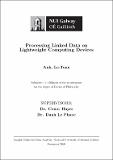| dc.description.abstract | The development of the Internet of Things (IoT) is enabling innovative and smarter domestic and commercial services. Due to the lack of skill and technology to make sense of IoT data, the full potential of the available information from IoT networks has not been achieved yet. It has long been recognised that standards for the interoperability and integration of data must play a key role in the value generated by IoT. Semantic technologies have been proposed to deal with data heterogeneity and to enable service interoperability in the IoT domain, and to underpin resource discovery, reasoning, and
knowledge extraction. The Semantic Web research community has been attentive to the issues of data integration and interoperability raised in the IoT. Many efforts have constituted important milestones towards the integration of heterogeneous IoT platforms and applications. Linked Data model is now the preferred data model for semantic IoT data, and Resource Description Framework (RDF) engines have been proposed to be used as semantic integration gateways for the IoT.
It has been proposed that a decentralised integration paradigm fits better with the distributed nature of autonomous deployment of smart IoT devices. The idea is that moving RDF data processing closer to the edge of the network will reduce network overhead/bottlenecks and enable flexible and continuous integration of new IoT devices/data sources. The state-of-the-art RDF engines suffer performance degradation when they are required to work on IoT edge devices that are significantly underequipped in terms of memory and CPU for supporting regular RDF engines.
In this thesis, we develop a scalable RDF engine for lightweight IoT devices, namely, RDF4Led. Our approach focuses on minimising memory consumption, maximising scalability, and processing performance. RDF4Led is designed with a RISC-style (Reduced Instruction Set Computer) design that simplifies the implementation with the purpose of reducing code footprint and memory footprint. We carefully redesign the RDF storage, indexing scheme and buffer manager to optimise flash I/O. We improve the join algorithm so that it significantly lowers the memory consumption used to evaluate SPARQL
queries. Furthermore, we demonstrate the feasibility of RDF4Led in different application scenarios. Firstly, we show how to use RDF4Led to enable the integration of different personal data spaces on mobile devices. We also demonstrate how to integrate RDF stores and blockchain to protect the ownership of the shared RDF data on IoT edge nodes. As a result, we introduce a novel distributed RDF store which leverages blockchain benefits for data publishers at the edges of networks. To the best of our knowledge, our system is the first of this kind. Finally, we introduce an federation mechanism to distribute the workload of RDF stream processing over IoT edge nodes. To enable such a mechanism, we integrate RDF4Led with CQELS to create Fed4Edge and RDF stream processing engine for IoT edge devices. | en_IE |


